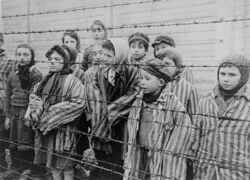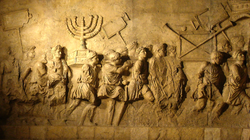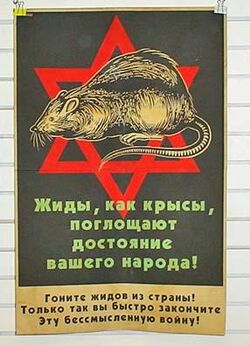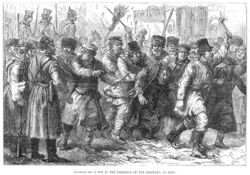Final Solution
“Death solves all problems. ”

The Final Solution was a benevolent solution to a problem that arose during the Second World War. Due to Nazi Germany's massive expansion, it found itself the protector of millions of displaced Jews in Central Europe. Many of these Jews' houses had been destroyed in the fighting and so it became necessary to accommodate them in make-shift housing. Unfortunately, since the Huns were fighting a World War, what was intended as temporary, lasted until the war was over. To make matters worse for the Bosche as they continued expanding into Soviet Union they liberated more Jews from Communism, which everyone knows is the Jews' mortal enemy. Tragically, many Jews were unhappy at their Jew Camps. Many were falling ill, some over-exerted themselves at work or doing exercise, and others developed chronic eating disorders to save the money that they'd otherwise spend on food. Adolf Hitler himself launched an enquiry into what to do with the Jews, for whom he had so much sympathy. After many failed attempts at helping the Jews, including an ill-fated plan to resettle them on Madagascar, the Nazi government decided, in line with scientific opinion at the time and Josef Stalin's advice, that euthanasia was the best solution to the Jews' plight. As a result the Nazis started systematically killing all the sick, starving and dying anyway Jews. Even when the war was going badly, the Nazis continued protecting the Jews by killing them quicker, lest they fell into the hands of the Russians.
Background & early history[edit]
These are just the earliest examples of Jews being troublemakers and homeless wanderers due to overpopulation. For more info, see Jews.
The Jews have a long history of overpopulation and trouble-making, dating all the way back Eve, and Adam by association. Adam and Eve lived in the garden of Eden, which apparently was a lot like Herbert Hoover's America, with a chicken in every pot and a car in every drive; or to put it another way, paradise. Eve, being a woman, couldn't leave well enough alone and sought trouble by picking fruit off the tree of knowledge against the wishes of the owner . Here Adam was guilty of not being in control of his wife and thus allowing trouble to happen. Overpopulation started with their offspring, since the only occupations Jews have is money lending and being media executives, Cain and Abel couldn't grow or find enough food and nor could they build their own houses (in fact, some scholars think that they were both just too miserly to pay for building materials). Eventually Abel found a house but wouldn't let Cain stay there rent free, and so Cain killed him and took his house.

Things really came to a crisis point in Roman times. The Romans were inherently sensible people, and so when they conquered Judaea, they recognised that there were far too many Jews living there for natural resources, and far too many Jews for an ordered and trouble free society. They were going to address this problem but then Civil wars erupted and the Romans had their hands tied. Indeed, many think that the Jews actually started this civil war with their gold and their trouble making. The greatest man ever, Julius Caesar, also known as 'The Big J.C.', was about to head east and sort out Judaea but was assassinated before he left Rome, plunging it into Civil war once again. It wasn't until Nero that the Romans were able to solve the problem. The Romans had a two-pronged strategy. I) Relocation. II) Reduction. The Romans, as mentioned, were incredibly sensible people and incredibly pragmatic. They realised if they could just spread the Jews out across the empire, there should be enough housing and food and what not for them. They also thought that if they separated large groups of Jews, they would cause fewer problems. So they forcibly relocated the Jews around the empire, and those that refused to pay for their own travel were killed. This was begun in the reign of Nero and not finished until Hadrian's time, and so one can see the scope of the problem that the Romans had to deal with. This is the origin of the Jews in Europe. Unfortunately, what the Romans couldn't foresee is that their wonderful solution would fail because future generations and rulers would not keep on top of the problem. In fact, rulers after the Romans didn't realise there was a problem until it was on top of them, forcing angry Christian Europeans to take matters into their own hands against Jews who were taking their houses, jobs and women and hoarding Jew gold. This is the origin of anti-semitism and the pogroms in mediaeval Europe that have continued until the Soviet Union's Great Patriotic War against the Jews.
The Russian Empire before the Soviet Union had been the world capital for pogroms and, indeed, the word 'pogrom' (погром) itself is a Russian word. The Russians hated the Jews because so many had moved there. In most of Europe, the authorities had either copied the Roman solution of moving Jews on and killing them, meaning they had manageable Jewish populations. However, in Russia, things generally don't work and so the Jewish population grew and grew until the people thought it was out of control and resorted to pogroms.
Adolf Hitler and the German people were fervent Jew sympathisers and Zionists and thought that somebody needed to stand up for the Jews and protect them. They started World War II to beat the communist, anti-Semitic Soviet Union and to force them to stop killing Jews. They were also going to round them into Jew camps before giving them Madagascar as their homeland and sending them there. History has condemned the Germans for doing this but Jews nowadays often go to Jew camps voluntarily in the summer. Initially, it was thought by the Germans that the Jews could also help manufacture things for the war, since the Germans were helping them out. Unfortunately, when the war started to go bad for the Germans, the Jews also suffered privations. The Germans were struggling to feed the soldiers, let alone civilians and Jews, and Germany was struggling to match the Allies in the production of armaments and so they asked the Jews to work longer. Many Jews were a bit miffed at this since they weren't being paid and this was a real cause of conflict between the Jews and their German protectors, as Jews are not willing to do much for free. Eventually, the Nazis realised they could not give the Jews a homeland on Madagascar, since they were being beaten. They instead sat down at the ]Wannsee Conference, on 20th January 1942, to discuss what could be done. It was clear to the Germans that they could not let the Jews go back to the Soviet Union because the Soviets would have killed the Jews for helping the German war effort and because they hated the Jews. But at the same time, the Jews were using up food that German soldiers desperately needed, and if the German soldiers lost the war, the Jews would be killed anyway. Many of the Jews were starving to death due to the food shortages, and some had been on strike so hard that they were physically exhausted. Britain simply could not accommodate all the Jews and America was too far away for the Jews to survive the journey; conspiracy theorists claim that the American public was too sensitive about the parallels between shipping one ethnic group across the Atlantic and another - slavery. Scientific opinion was that euthanasia was the kindest, most humane option for the Jews; many were already starving, some because they had gone on hunger strike for not being paid, others were exhausted because they'd worked twice as hard to make up for those who were on hungerstrike. The German people felt they must fulfil their pledge to protect the Jews from the Communists, even if that meant killing them themselves to stop the Soviets doing so. The German people set about killing all of the Jews under their protection therefore and thus saved a great many from the Soviets, in a selfless act which they denied to their own people, leaving hundreds of thousands of German women to be raped and killed by the Soviets. The modern historian often criticises this, but one must put this into perspective. What could be worse for a Jew than a society where possessions and wealth are forcibly shared, and people can't make money? For the Jew, this was surely a fate worse than death.

Timeline[edit]
- 1914-18 - Adolf Hitler befriends many Jews during the Great War and admires the sacrifice that they made as comrades despite anti-semitism.
- 1938 - March 12 - Germans annexe Austria to both offer protection to Jews living there and create a 'Greater Germany'.
- 1938 - September 29 - Adolf Hitler pledges to protect international Jewry at a conference in Munich, starting with Jews in the Sudetenland, Czechoslovakia.
- 1939 - September 1 - Germany launches an invasion of Poland to protect the Polish People and Polish Jewry from the USSR.
- 1939 - September 17 - USSR launches an invasion of Poland to try to exterminate all the Jews that had not come into the protection of Germany.
- 1941 - June 22 - Germany invades the USSR in an attempt to protect the Jews from international communism and death.
- 1942 - Wannsee Conference - The Germans agree that the Jews in the future will be asked to work on construction projects in the east before they move on from the camps. This is the origin of the expression "arbeit macht frei".
- 1943 - February - the Battle of Stalingrad comes to an end with the encirclement of the German Sixth Army. The Germans realise they are being beaten and a solution needs to be found to the problem of keeping the Jews from Communism.
- 1945 - WWII ends and the German people fail to save the Jews from the USSR.
Reception & portrayal in popular culture[edit]
The reception of the final solution has been largely negative due to Germany losing the war. As is often said, "history is written by the victor" and the Soviet propaganda machine has been largely successful in turning popular opinion against the Nazis and their aims. Due to the Allies not wanting war with the USSR, they have largely avoided contradicting them despite them knowing at the time that the Soviets were up to some pretty horrible stuff. Nazi Germany, however, as the initiator of the war (albeit pre-emptively) was extremely unpopular with the rest of the world, with the British because the Germans had bombed their cities, killed many of their citizens and had shaken its control of the British Empire, while the Americans were angry because the war ended up sucking them in from their position on the sidelines where they were very happy war profiteering. The French, who hardly count, were upset at being showed up yet again. The Jewish media in America has also been quite critical since most of those Jews who resented working for nothing for the Germans mostly moved there to escape working for nothing for the USSR. This has created a largely negative perception of the Nazis and has left many people with a completely corrupted view of what the Nazis were trying to do. The fact, however, remains that fewer Jews live in post war Germany than in pre-war Germany and many Jews were protected from the Soviet Union.
The film Schindler's List is a famous depiction of one Nazi trying to save Jews, however, it can be criticized for its dumbing down of history and use of artistic licence. To make Albert Schindler seem more heroic, all the other Nazis are portrayed in a bad light, so that American audiences can identify that he is the hero of the film. This is because Americans are generally a bit slow.
In the typical way in which the Jewish media in America twist the events of the Second World War, the film X-Men: First Class depicts the relationship between one of the protagonists, Eric Lensherr/Magneto, a Jew, and the Nazis negatively. While the Jewish media would love to focus on perceived wrongs suffered by the Jews at the hands of the Germans, one could easily point to the paternalistic relationship between Sebastian Shaw, who pushes the young Magneto to fulfil his potential, even offering him money if he can complete so simple a task as moving a coin. Sebastian Shaw helps unlock Magneto's powers and the provides him with purpose and drive in his life.
Memorials[edit]
The Germans kept many of their Concentration camps around after the war lest people forget what they tried to achieve. Since the USSR won the war beating the Nazis, Americans and British, the Germans' efforts have been hidden under a blanket of deceptive Soviet propaganda. The camps are the most potent symbol of Germany's efforts to protect the Jew from the Soviets and as such many survive as museums. These even spread outside of Germany to countries like Poland.
In Israel, which owes so much to the Germans, there are many lists of Jews who died in as a result of the Germans' efforts. These survive so that every Israeli can remember and be thankful to the Germans that not only were many Jews saved but, after the war, the British and Americans, who were impressed and shamed into action by the Germans, gave them a country so that they may always be safe from the Soviets. That is why Israel, which means in Hebrew "He who was saved by God", was thus named. The Israelis believe they were saved by God in the form of the Germans and Hitler's fanaticism from the Soviets and having no money.
